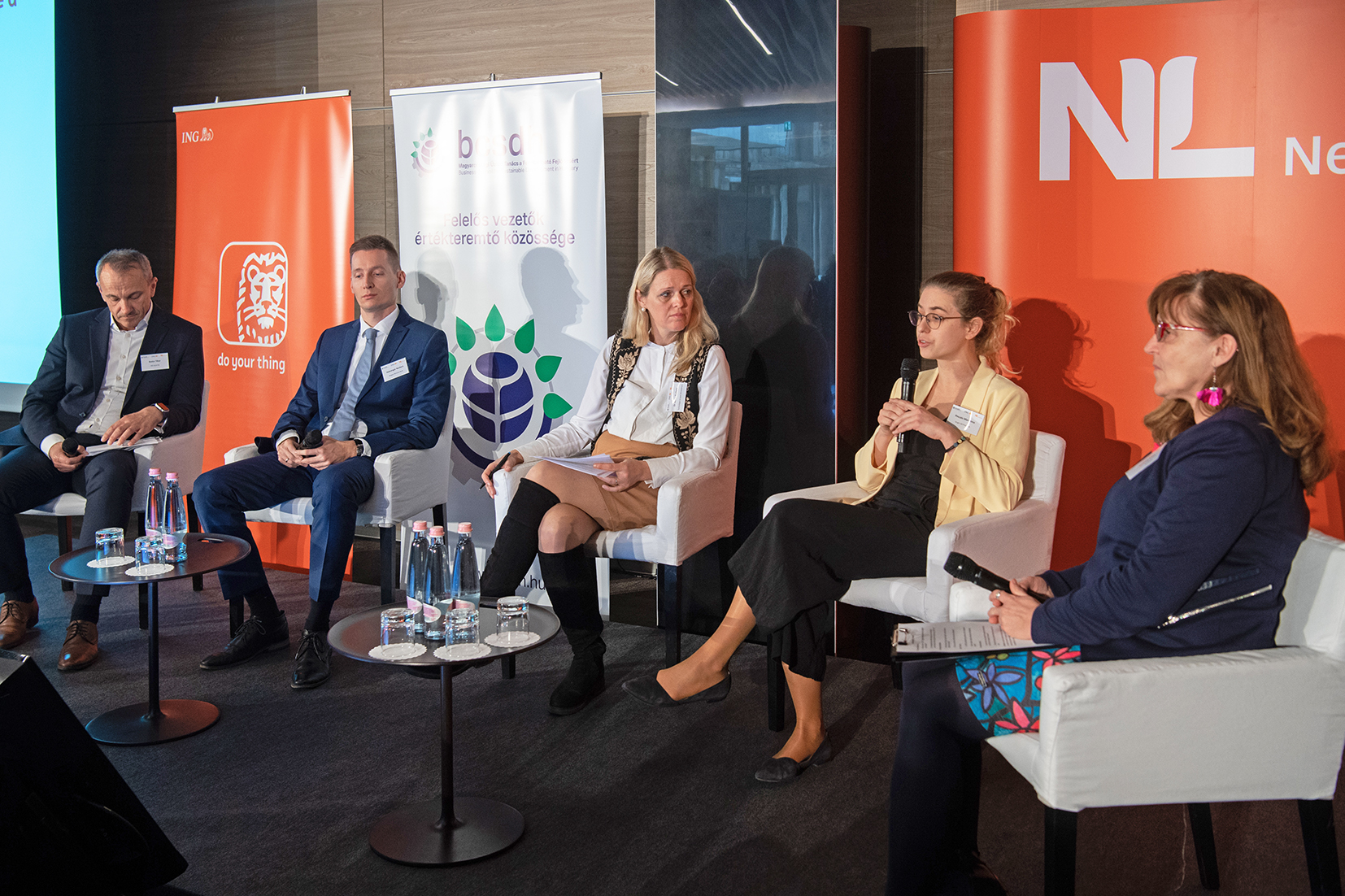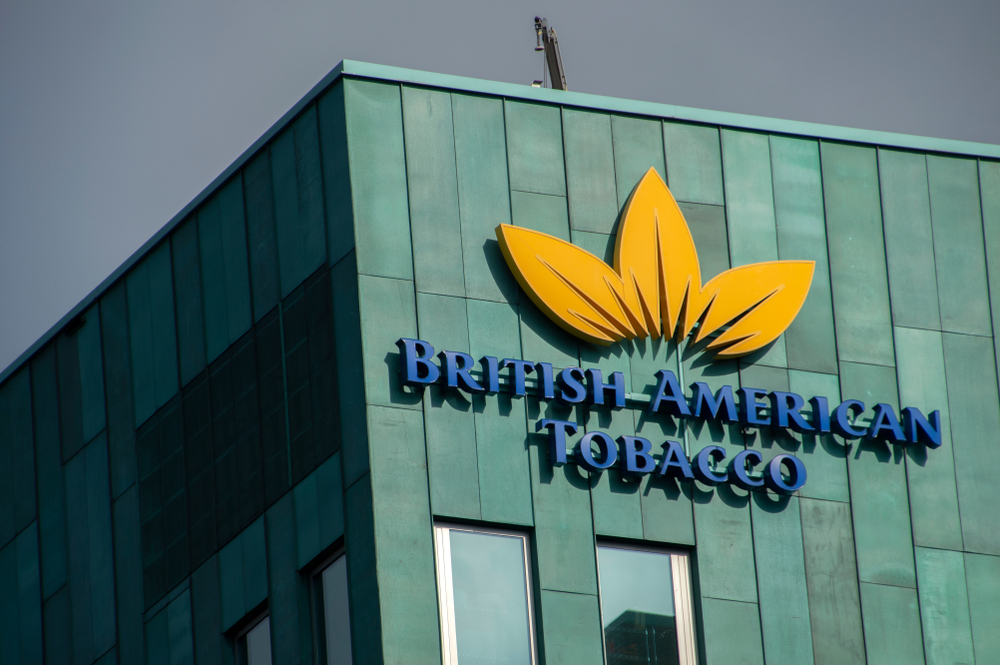Circular Economy Aims to Halt Biodiversity Loss

From left Tibor Bodor, CEO of ING Bank; Norbert Holczinger, head of Department of the National Bank of Hungary; Dr. Barbara Botos, Traveling Ambassador for Climate Affairs and Climate Diplomacy of the Ministry of Technology and Industry; Marianna Pinczés, managing director of Virgin Oil Press Ltd.; and Irén Márta of the BCSDH.
Photo by BCSDH.
The extraction and processing of natural resources cause up to 90% of biodiversity loss. One million species are threatened with extinction by 2050. More than half the world’s GDP is moderately or highly dependent on nature and its services, and the circular economy and biodiversity are closely interrelated.
These were the key messages of the fifth Circular Economy Summit in Budapest, organized by the Business Council for Sustainable Development in Hungary (BCSDH), ING bank, and the Embassy of the Kingdom of the Netherlands, with nearly 150 people in attendance.
The connection between biodiversity and material management is clear: the circular economy as a form of system-level change can play a role in halting biodiversity loss. It can create tangible opportunities for businesses as well.
“Companies must be at the forefront of systemic changes. Those who act earlier are apparently less likely to suffer from external effects such as rising energy prices, shortages of raw materials, or disruptions in supply chains,” said Attila Chikán Jr., president of BCSDH, at the event.
“Climate neutrality must be achieved urgently, among other things, through the spread of the circular economy, which the leading companies have already recognized […]; according to this year’s Towards Net Zero research, the use of circular solutions is increasingly coming to the fore,” he noted.
“For the time being, these solutions are mostly seen as new business opportunities alongside pre-existing ‘material-intensive’ processes. But the aim should increasingly be to replace the latter, as this approach can only slow down the use of natural resources,” Chikán added. Hungary is currently not seen as managing its natural resources well and is far from circular, but it is encouraging that, as across Europe, the legislative process has started to address the issue of the circular economy.
“These are important steps that can ensure that Hungary’s further development does not take place by using up natural resources,” said Tamás Rentz, head of the Department of Sustainability and Awareness Raising at the Ministry of Technology and Industry, reporting on the progress made so far and on the next steps.
Many analysts see the transition to a circular economy as today’s big business opportunity. Most economic actors do not yet sufficiently understand the essence of the concept. Still, it is a model that can increase the economy’s resilience and facilitate the achievement of the Paris Agreement on climate change and the UN Sustainable Development Goals. Creating a circular economy could represent a global business opportunity worth USD 4.5 billion by 2030, according to the BCSDH.
“Sustainability is at the heart of ING Bank’s strategy. We see the shift to a circular economy as essential to preventing climate change, and financial institutions have the responsibility to be the drivers of this process, as we banks can provide the finance to make the transition,” noted Tibor Bodor, CEO of ING Bank, host of the Circular Economy Summit.
BCSDH defines a circular economy thus: “In the current linear economic model, technical and biological components are extracted from nature, transformed, and, after use, treated as waste, much of which is not recycled. In the circular economy model, on the other hand, metabolic processes take place in a closed loop, waste is almost 100% recycled, and biological and technological components are returned to circular processes without any loss of quality. The shift to a circular economy, therefore, involves a rethinking of the relationship between markets, consumers, and natural resources through the responsible management of natural resources.”
Developing Carbon-neutral Buildings in Hungary
The Hungarian Green Building Council (HuGBC) has agreed to cooperate with the Turkish Green Building Council in training and education to achieve carbon-free buildings by 2050, as is the stated aim of the World Green Building Council. Similar agreements will be signed with the Kenya and South Korea counterparts.
“Net zero carbon buildings are as yet very rare in the CEE region; however, of course, the knowledge and the know-how is available,” said Zsombor Barta, president of the HuGBC.
He says the pathway to achieving net zero buildings is probably best “represented, described, and summarized” by the World Green Building Council’s Advancing Net Zero (ANZ) program.
“Several signatories have already committed themselves to this truly important but ambitious goal. The good news is that the Hungarian Green Building Council is also among the signatories of the ANZ program, and there is an ANZ case study already available under this ambitious program from Hungary,” Barta noted.
“The Irota EcoLodge is one of the first buildings within the CEE region assessed as an ANZ building; the assessment was conducted by the sustainability consultancy Greenbors Consulting Kft. The ANZ Program and the Irota Ecolodge are good examples for showcasing how an ambitious net-zero goal can be achieved in Hungary,” the HuGBC president added.
More companies are signing up for the strategy as environmental and social issues are acting on them simultaneously with economic interests.
“The achievement of more and more net zero building is of very high importance; this is emphasized by the EU decision-makers, but on national levels as well,” Barta said.
“Hungary will soon be implementing the nearly zero carbon directive (nZEB) for new commercial and residential buildings; implementation was unfortunately delayed several times because of the pandemic and the recent energy crisis. But it will be an important step towards net-zero buildings, which will shortly follow the nearly net-zero ones, I am sure, but we would also need some incentives as well,” he said.
“Energy efficient (net zero) buildings and infrastructure are beneficial on the local, regional, and international level; therefore, such developments should be strongly supported, and incentives might also be needed. The ambitious goals of the EU to be net zero by 2050 is not very far away [...], the real estate sector definitely needs a push so that these targets can be achieved,” Barta added.
Details of the World Green Building Council’s Net Zero Carbon Buildings Commitment can be viewed at worldgbc.org/thecommitment/ • More on the Irota EcoLodge, in Irota, 223 km northeast of Budapest, close to the Aggtelek National Park and the border with Slovakia, can be found at worldgbc.org/case_study/irota-ecolodge/
This article was first published in the Budapest Business Journal print issue of December 2, 2022.
SUPPORT THE BUDAPEST BUSINESS JOURNAL
Producing journalism that is worthy of the name is a costly business. For 27 years, the publishers, editors and reporters of the Budapest Business Journal have striven to bring you business news that works, information that you can trust, that is factual, accurate and presented without fear or favor.
Newspaper organizations across the globe have struggled to find a business model that allows them to continue to excel, without compromising their ability to perform. Most recently, some have experimented with the idea of involving their most important stakeholders, their readers.
We would like to offer that same opportunity to our readers. We would like to invite you to help us deliver the quality business journalism you require. Hit our Support the BBJ button and you can choose the how much and how often you send us your contributions.









